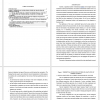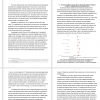Тема: Adaptation of International Students from Asian Countries at St. Petersburg State University
Закажите новую по вашим требованиям
Представленный материал является образцом учебного исследования, примером структуры и содержания учебного исследования по заявленной теме. Размещён исключительно в информационных и ознакомительных целях.
Workspay.ru оказывает информационные услуги по сбору, обработке и структурированию материалов в соответствии с требованиями заказчика.
Размещение материала не означает публикацию произведения впервые и не предполагает передачу исключительных авторских прав третьим лицам.
Материал не предназначен для дословной сдачи в образовательные организации и требует самостоятельной переработки с соблюдением законодательства Российской Федерации об авторском праве и принципов академической добросовестности.
Авторские права на исходные материалы принадлежат их законным правообладателям. В случае возникновения вопросов, связанных с размещённым материалом, просим направить обращение через форму обратной связи.
📋 Содержание
Chapter 1. THEORETICAL FOUNDATIONS STUDIES OF ADAPTATION OF
FOREIGN STUDENTS 7
1.1 SOCIAL ADAPTATION AS A SUBJECT OF SOCIOLOGICAL ANALYSIS....?
1.2. ADAPTATION OF INTERNATIONAL STUDENTS: FACTORS AND
BARRIERS 27
Chapter 2. PECULIARITIES OF ADAPTATION OF FOREIGN STUDENTS OF
SAINT PETERSBURG STATE UNIVERSITY .40
2.1 ADAPTATION OF INTERNATIONAL STUDENTS: THE MAIN PROBLEMS 40
2.2 RUSSIAN STUDENTS' IDEAS ABOUT THE ADAPTATION OF FOREIGN
STUDENTS: PROBLEMS AND CONTRADICTIONS 56
CONCLUSION 66
LIST OF REFERENCES 69
ADDITIONAL MATERIALS .75
📖 Введение
The significance of this issue is undoubtedly high, given the large number of international students in Russian universities, who face various challenges in adapting to their new environment. This phenomenon requires attention, as it can lead to students dropping out or transferring from Russian universities. With the increasing internationalization of education, it is essential to understand the process of adaptation for international students. Their successful integration into the Russian educational system is crucial for their academic success and overall well-being. European, American, and other models are described and studied in the literature. Essentially, the adaptation models are derived from the European approach. It is important for us to consider the cultural aspect in adapting students, and that is why it is interesting to see how they are relevant at the present time. Many international students face difficulties adapting to the cultural and academic expectations of Russian universities and this can lead to feelings of isolation and stress, which can have a negative impact on their academic performance and overall experience in Russia. The largest group of students from non-CIS countries are students from Asian countries. Adaptation difficulties are particularly challenging for them, due to cultural and language barriers. In some cases, Russian universities serve as a "transit" point for students who are planning to continue their education in European countries. This adds to the complexity of the adaptation process and highlights the importance of understanding this phenomenon.
The number of international students studying in Russia has significantly increased over the past five years, rising by more than 23%. In 2018, there were approximately 290,000 foreign students studying in the country, and this number has since grown to 355,000 in 2024. As of that year, approximately 6,000 students from more than 100 countries were enrolled at St. Petersburg State University, representing a diverse range of backgrounds.
The key aspects of the research question include understanding the socio-cultural factors influencing the success of the adaptation of foreign students in Russian University, recommendations for the support of foreign students and the study of the phenomenon of second choice.
Object of the study: the adaptation of foreign students from Asia in Russian University.
Subject of the study: problems and contradictions of asian foreign students' adaptation in Russian University.
Aim of the study: to identify the problems of intercultural communication and social adaptation of foreign students (using the example of St. Petersburg State University), to develop recommendations for their solution and to identify the causes of the "transit" state of Russian education.
To achieve this goal, it was necessary to solve the following tasks:
1. To study theoretical approaches to the sociological analysis of adaptation.
2. To study the factors and obstacles to the adaptation of international students.
3. Based on the results of the study, to identify the problems faced by international students from Asian countries in the process of adaptation; to assess the level of awareness of local students regarding the specific needs of international students and their attitude towards them.
4. To determine the reasons for the "transit" state of Russian education using the example of students from Asian countries and the choice of European universities.
There are certain theoretical preconditions for studying the process of adaptation in sociology. The term "adaptation" initially appeared in the field of physiology and was primarily used in a biological context. Subsequently, adaptation began to be examined using psychological and sociological methodologies. Within the scope of our research, the concept of "adaptation" has been considered from various theoretical perspectives, including positivism, anomie theory, interpretive sociology, and structural functionalism. A comparison of socialization and adaptation has been conducted, and the main distinctions and similarities have been identified.
...
✅ Заключение
The phenomenon of adaptation is not merely a human condition, but rather a process through which a social entity acquires stability and equilibrium in relation to the influences of its environment. Although adaptation has been studied prior to the formalization of sociology as a scientific discipline, interpretations of this phenomenon have varied. Initially, adaptation was equated with adjustment, and these terms were used interchangeably. However, with the emergence of the first sociological theories, the concept of adaptation began to take on a more nuanced meaning, serving as a broader construct than simply adaptation. In Russian sociology, different approaches to understanding adaptation have emerged. Two main perspectives can be identified: one that denies human adaptability in society and another that acknowledges it.
The first approach is based on the philosophy of existentialism, which views the individual as inherently free. The second approach considers the process of personal adaptation in the context of the perceived alienation of society from the individual, describing adaptation as a means of coping with social demands. Many scholars acknowledge the connection between adaptation and socialization.
In our opinion, the main differences between adaptation and socialization can be attributed to different functional responsibilities, variations in the depth and duration of impact on an individual, as well as the scale of experience acquired during each process. Socialization occurs through the acquisition of the social experience of society as a whole, while adaptation involves acquiring the experience of a particular community. The content of social adaptation can be summarized as an integral, dynamic, continuous, and relatively stable process of interaction between individuals or groups and their social environment. During this process, individuals develop the abilities to navigate changing situations, formulate appropriate behavioral models, and rationally utilize various resources to assess and coordinate their self-worth and opportunities. This enables them to fully realize their needs and aspirations.
Barriers to adaptation are significant not only in identifying them, but also in discovering effective methods to overcome them. Different educational institutions
67 have varying approaches to assisting foreign students: at one university, student clubs are established, volunteers (buddies) are available to provide any required assistance; at other universities, assistance ends with learning the Russian language and celebrating national holidays. An area that holds promise for adaptation work is the organization of tutoring services, the establishment of psychological and educational support for international students.
As part of our research, we identified the main challenges and obstacles to the successful adaptation of Asian students. In general, the assumption that it is more difficult for them to adapt than for other students from foreign countries has not been confirmed. These include the language barrier, which can significantly impact academic performance and success, as well as loss of motivation, fear and embarrassment in interacting with the local community due to a lack of language skills. The main motivations for pursuing higher education in Russia among international students are the relatively low cost of tuition and the prestige and recognition associated with attending a Russian university. Other factors include recommendations from family and friends, as well as various scholarships and grant opportunities.
The findings suggest that there is a lack of theoretical frameworks and methodological tools for investigating the phenomenon of "second-choice" country selection among international students. Students who select countries based on this criterion typically differ significantly in terms of their educational motivation and selection criteria. Discontent with a second choice country can also affect learning outcomes and levels of engagement in the learning process, creating a cycle where lower levels of engagement lead to lower satisfaction with the learning experience, resulting in lower levels of student satisfaction with their education and their likelihood of recommending the country to others.
...





